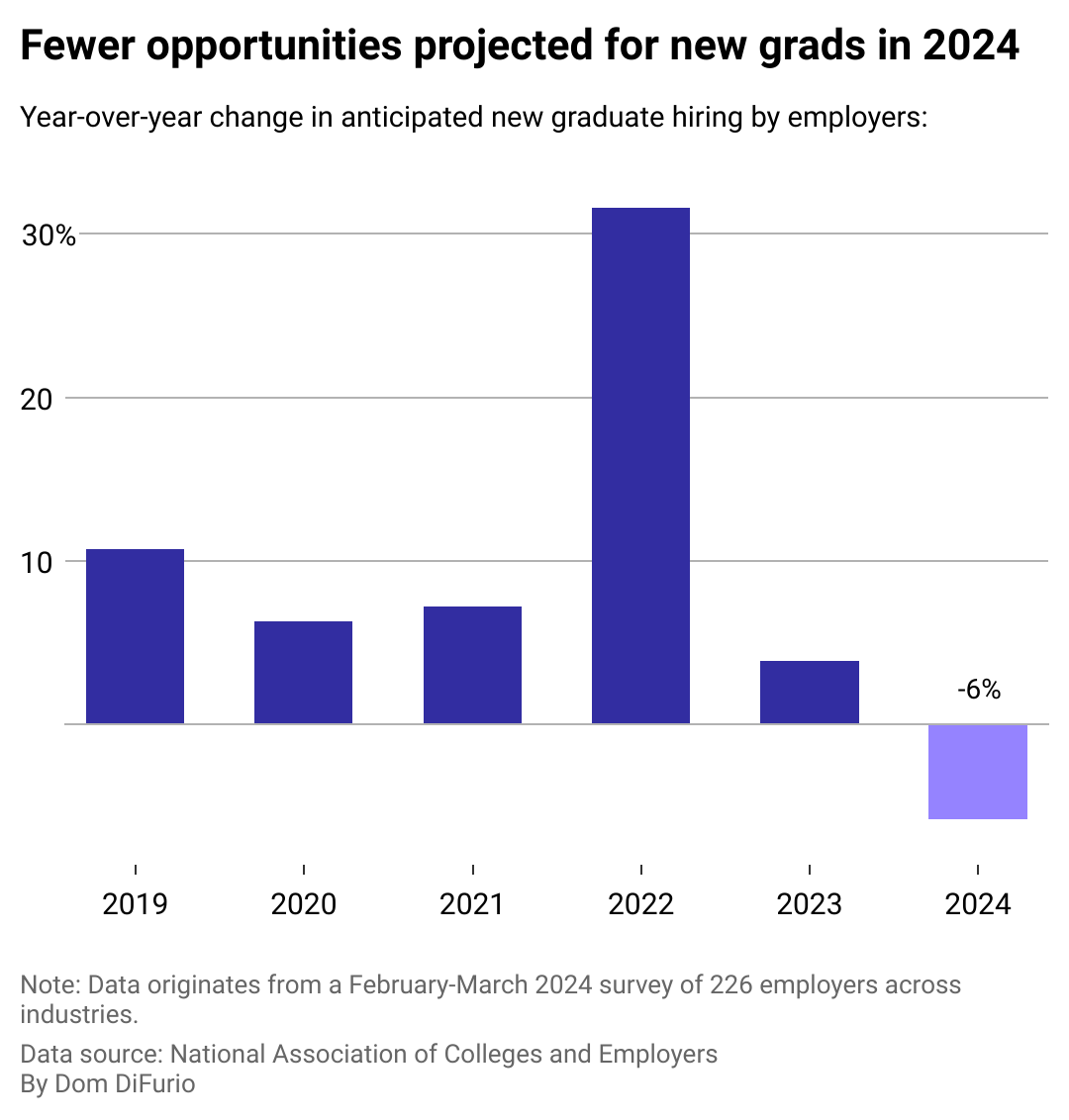Why 2024 might be one of the hardest years for recent college grads to get hired
djrandco // Shutterstock
Why 2024 might be one of the hardest years for recent college grads to get hired
Young woman greeting a recruiter with a handshake.
The graduating class of 2024 may have the most trouble finding a job postgraduation compared to the last five years of graduating classes before them.
JobTest.org analyzed survey data from the National Association of Colleges and Employers to show how hiring projections for recent college graduates this year compare to previous years. NACE conducts a survey on hiring intentions for full-time and internship positions annually.
Today’s college graduates are entering the workforce as the labor market cools from previously red-hot levels during the COVID-19 pandemic years. At its peak in March 2022, the country had two job openings for every unemployed person, providing workers with immense leverage to improve wages, according to the Bureau of Labor Statistics. This spring, however, that job market has cooled off considerably with openings reaching a three-year low. As of April, there is only about one opening available per job seeker.
Hot job markets of yesteryear may have helped notch wage gains for a considerable number of recent graduates, as evidenced by the $60,000 starting salary the typical recent graduate with a bachelor’s degree saw in 2023—a nearly $7,000 increase from 2019, according to Federal Reserve Bank of New York data.
From the 1990s up until recently, college graduates between the ages of 22 to 27 were highly employable, meaning they tended to see lower levels of unemployment compared to the overall workforce, according to Federal Reserve Bank data. Since January 2021, however, their unemployment rate has trended slightly higher than the overall rate. In March of this year, 4.7% of recent grads were unemployed compared to 3.7% of all workers.
Even with an elevated unemployment rate in recent years, projections from employers have shown a desire to snap up grads since 2019. That trend, however, could take a slight dip for the class of 2024, depending on where they’re looking to land work.
![]()

JobTest.org
Several industries pull back, impacting overall 2024 hiring outlook
A bar chart showing year over year projected change in recent college graduate hiring by employers for 2019-2024. The rate of change peaked in Spring 2022 with 31% more hires expected. Spring 2024 marks the lowest point with a -6% expected change in hiring.
Roughly 6% fewer employers surveyed by NACE this spring anticipate hiring graduates from the class of 2024, a figure that’s declined from when the organization posed the same question to employers in the fall of 2023 ahead of the school year.
This is likely the result of certain industries like pharmaceuticals, electronics manufacturers, finance, insurance, and real estate signaling they’re pulling back on hiring graduates this year, according to the NACE survey.
NACE attributes the decline to a normalization of elevated hiring over the last few years. Several industries are also facing economic and technological headwinds, making things difficult for workers. A low supply of homes on the market is making it harder for those in the real estate sector to earn money. In many professional services like insurance and finance, companies are experimenting with using new generative AI tools to automate the tasks typically assigned to entry-level positions.
Other industries, however, are still planning to increase hiring compared to last year, with the largest planned hires coming from the manufacturing sector, based on the survey.
The good news for graduates that can land their dream job in this cooling economy? They should be able to keep it. The threat of layoffs appears to be minimal for the time being, as they recently hit their lowest level since the end of 2022. And once they’re in the workforce, those with college degrees also tend to have an unemployment rate lower than that of all other workers with only 2.2% unemployed versus 3.7% of all workers.
Story editing by Carren Jao. Additional editing by Elisa Huang. Copy editing by Tim Bruns.
This story originally appeared on jobtest.org and was produced and
distributed in partnership with Stacker Studio.

